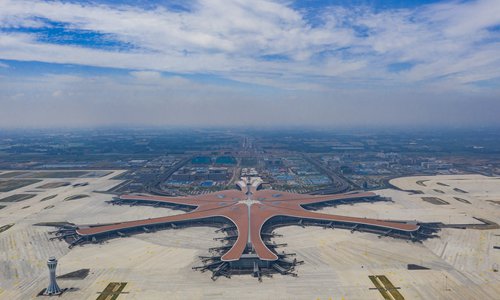HOME >> BUSINESS
Beijing Daxing International Airport to balance transport, tourism functions
By Tu Lei Source:Global Times Published: 2019/10/13 21:46:01

The Beijing Daxing International Airport Photo: IC
Beijing Daxing International Airport will balance its dual functions of being a transportation hub and tourist spot in the future, a senior official from China's air transport regulator said over the weekend.
Liu Chunchen, an official from the Civil Aviation Administration of China (CAAC) said that as of October 10, the airport had 1,237 flights taking off and landing, with an average daily frequency of 80 flights. Departing and arriving passengers totaled 187,000, with a daily average of 12,400.
More than 70,000 people visited the new airport daily for sightseeing, and total visitors reached 470,000 during the week-long holidays, resulting in a 13:1 ratio of visitors to passengers, he said. On October 3 in particular, there were 107,000 visitors, a ratio of 24:1 to passengers.
A Beijing resident surnamed Li told the Global Times on Sunday that he visited the new airport on October 6, mainly to make a comparison with the Beijing Capital International Airport with future trips in mind.
When asked if this many visitors will affect the normal operation of the airport, Liu said the airport was running very smoothly and tourists did not have any impact on the airport's operations.
In the future, the airport's transportation hub function and sightseeing functions will be balanced, so that both can be taken care of, he said. "We are learning from the successful experience of other airports."
The airport will see 15 new carriers starting operations after October 27, which is the beginning of a new flight season, including eight overseas carriers. The daily fleet volume at the airport will reach 280, the CAAC said.
The airport opened on September 25, a monumental moment that highlighted both the country's prowess in building a massive infrastructure and its ambition to further connect to the world as well as maintain its rising global status.
The airport, which has four runways, parking spaces for 150 airplanes and a 700,000-square-meter terminal, is expected to handle 45 million passengers by 2021 and 72 million by 2025.